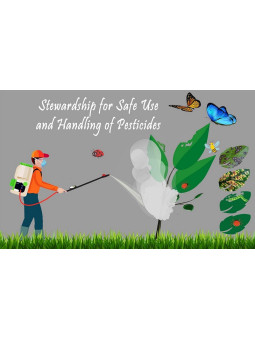Stewardship for Safe Use and Handling of Pesticides (2021)

| Editors: P.K. Chakrabarty, Rajib Karmakar, Selvakumaran Sellappan, M.S. Saharan, Kalyan K. Mondal, M.S. Gurjar and Robin Gogoi |
| Year: 2021 |
| ISBN: 978-81-953723-3-1 |
About the Book
Plant Protection is critical to food and nutritional security not only in India but in the world. FAO estimates peg global losses of food crops due to weeds, diseases and insect pests to 20-40%. OECD-FAO Agricultural Outlook report indicates: without pesticides, more than half of our crops would be lost to pests and diseases. In-depth analysis Panel for the future of Science and technology, European Parliamentary Research Services, based on a study in 2019 reported that crop yields in Europe is liable to be reduced due to pests depending upon the crops between 19% (wheat) and potato (40%). Although no systematic studies have been conducted on potential crop losses from diseases and pests in India, it is imperative that such losses are likely to occur throughout the world, including in India, without the use of plant protection practices. Although, the number of biopesticides and biostimulants in agriculture for plant protection has been increasing in India recently, but plant protection world over is practiced predominantly through the use of agrochemicals. As per World Health Organization, 5-10 lakh people every year suffer due to health effects due to pesticide poisoning. Such harmful effects from use of agrochemicals mostly happen due to injudicious use of pesticides and failure to practice Good Agricultural Practices (GAP). Enhancing awareness of farmers on safe and judicious use, proper handling of agrochemicals and application technologies, through product stewardship and safety education thus can alleviate such problems. Regular training of farmers on agrochemical use policy, use of personal protective devices, personal hygiene and sanitation practices during and after application of pesticides can lead to improved efficiency of plant protection and also preserve human health and environmental safety. With the aim of imparting stewardship to farmers on safe use and handling of plant products and practices and to follow GAP, Indian Phytopathological Society has decided to publish a bulletin entitled “Stewardship for Safe Use and Handling of Pesticides”. The Bulletin through its seven chapters highlights the role of stewardship in increasing efficiency of plant protection, while reducing pesticide poisoning. The bulletin also includes a section on “Do and don’ts of pesticide usage”, depicted through hand drawn cartoons, with simple and lucid commentary. To our understanding this is the first such cartoons publication representing Indian farm situation. The publication also presents a section on science led explanations to bust some of the popular myths existing in the country surrounding use of pesticides. The bulletin is intended to provide stewardship to farmers and other stakeholders of plant protection.
Contents
|
1. |
Foreword |
iii |
|
2. |
Preface |
v |
|
3. |
Introduction |
1 |
|
4. |
Chapters |
|
|
|
1.
Stewardship for Safe Use of Pesticides |
5 |
|
|
2.
Use of Pesticides: Keys for Safe Handling |
11 |
|
|
3. Pesticide Application Technology and Use of
Appropriate Nozzle - A Key to Effective Pest Management |
57 |
|
|
4.
Level of Toxicity of Pesticides |
67 |
|
|
5. Good Agricultural Practices: Key to MRL – Compliance
good exportable harvest |
73 |
|
|
6.
Do's and Don'ts |
77 |
|
|
7.
Pesticides: Some Myths and Realities |
95 |
|
5. |
Annexure – 1 Maximum Residue Limits of Pesticides |
107 |